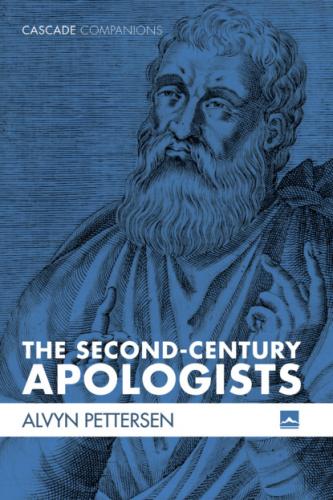Cascade Companions
The Christian theological tradition provides an embarrassment of riches: from Scripture to modern scholarship, we are blessed with a vast and complex theological inheritance. And yet this feast of traditional riches is too frequently inaccessible to the general reader.
The Cascade Companions series addresses the challenge by publishing books that combine academic rigor with broad appeal and readability. They aim to introduce nonspecialist readers to that vital storehouse of authors, documents, themes, histories, arguments, and movements that comprise this heritage with brief yet compelling volumes.
Recent titles in this series:
Feminism and Christianity by Caryn D. Griswold
Angels, Worms, and Bogeys by Michelle A. Clifton-Soderstrom
Christianity and Politics by C. C. Pecknold
A Way to Scholasticism by Peter S. Dillard
Theological Theodicy by Daniel Castelo
The Letter to the Hebrews in Social-Scientific Perspective
by David A. deSilva
Basil of Caesarea by Andrew Radde-Galwitz
A Guide to St. Symeon the New Theologian by Hannah Hunt
Reading John by Christopher W. Skinner
Forgiveness by Anthony Bash
Jacob Arminius by Rustin Brian
The Rule of Faith: A Guide by Everett Ferguson
Jeremiah: Prophet Like Moses by Jack Lundbom
Richard Hooker: A Companion to His Life and Work by W. Bradford Littlejohn
Scripture’s Knowing: A Companion to Biblical Epistemology by Dru Johnson
John Calvin by Donald McKim
Rudolf Bultmann: A Companion to His Theology by David Congdon
The U.S. Immigration Crisis: Toward an Ethics of Place
by Miguel A. De La Torre
Theologia Crucis: A Companion to the Theology of the Cross
by Robert Cady Saler
Theology and Science Fiction by James F. McGrath
Virtue: An Introduction to Theory and Practice by Olli-Pekka Vainio
Approaching Job by Andrew Zack Lewis
Reading Kierkegaard I: Fear and Trembling by Paul Martens
Deuteronomy: Law and Covenant by Jack R. Lundbom
The Becoming of God: Process Theology, Philosophy, and Multireligious Engagement by Roland Faber
“Here is a book that offers both a thoroughly clear exposition of the writers who’ve been called the first Christian philosophers, and a guide to how their thoughts might relate to the challenge of making good intellectual sense of Christianity today. It is a learned, accessible, insightful survey of one of the great formative periods in the history of the Christian mind.”
—Rowan Williams, University of Cambridge
“This thoughtful and scholarly book has revived my appreciation of the Apologists and my desire to re-read them. It provides an accessible introduction for those who have not encountered them before and a fresh and insightful reading for those who know them well. For both it invites reflection on some of the important issues they still raise for us today.”
—Carol Harrison, University of Oxford
“Alvyn Pettersen presents his considerable scholarship in an accessible and engaging manner. In this very helpful study of the letters of six second-century Apologists and their refutation of charges against Christians of being atheists, cannibals, and partakers in incest, he gives us not only fascinating historical insights but food for thought concerning the business of apologetics in our own age and, indeed, the very nature of the Christian faith.”
—John Inge, Bishop of Worcester, UK
The Second-Century Apologists
Alvyn Pettersen
The Second-Century Apologists
Cascade Companions
Copyright © 2020 Alvyn Pettersen. All rights reserved. Except for brief quotations in critical publications or reviews, no part of this book may be reproduced in any manner without prior written permission from the publisher. Write: Permissions, Wipf and Stock Publishers, 199 W. 8th Ave., Suite 3, Eugene, OR 97401.
Cascade Books
An Imprint of Wipf and Stock Publishers
199 W. 8th Ave., Suite 3
Eugene, OR 97401
www.wipfandstock.com
paperback isbn: 978-1-7252-6535-6
hardcover isbn: 978-1-7252-6526-4
ebook isbn: 978-1-7252-6527-1
Cataloguing-in-Publication data:
Names: Pettersen, Alvyn, author.
Title: The second-century apologists / by Alvyn Pettersen.
Description: Eugene, OR: Cascade Books, 2020 | Series: Cascade Companions | Includes bibliographical references and index.
Identifiers: isbn 978-1-7252-6535-6 (paperback) | isbn 978-1-7252-6526-4 (hardcover) | isbn 978-1-7252-6527-1 (ebook)
Subjects: LCSH: Apologetics—History—Early church, ca. 30–600 | Aristides—active 2nd century—Apology for the Christian faith | Epistle to Diognetus | Justin—Martyr Saint | Tatian, ca. 120–173 | Athenagoras—active 2nd century | Theophilos—Saint—active 2nd century | Christianity—Philosophy—History
Classification: bt1115 p48 2020 (print) | bt1115 (ebook)
Manufactured in the U.S.A. 08/28/20
To Catherine, Robert, and Elizabeth,
two daughters and a son in whom I delight and of whom I am very proud
Acknowledgments
My thanks are due to many. In particular, I wish to thank the Chapter of Worcester Cathedral for granting me a sabbatical during which I began the research that underlies the content of this book. I am immensely grateful to the Rector and Fellows of Exeter College, Oxford, for electing me to a visiting Fellowship for the period of my sabbatical. This offered me very generous and convivial hospitality. Above all, it greatly facilitated my research, and provided rich intellectual stimulus both within and beyond the College. I am very appreciative of the wise, supportive, but not uncritical friendship which both Professor Carol Harrison, of Christ Church, Oxford, and Dr Rowan Williams, Master of Magdalene College, Cambridge, have extended to me, especially as I have been writing this book. Above all, I wish to thank my family. They have been patient and encouraging, ever urging me to return to my study in the basement, or, as they termed it, the dungeon of our house. “Back to the dungeon, dungeon troll,” they would say. “The book calls.” To each and all I am most thankful.
Alvyn Pettersen
Oxford, March 2020
Introduction
This book looks at the writings of six Christian Apologists of the mid-to-late second century as they responded to some of the charges levelled against their Christian contemporaries. Then the faith of Christians was accused of being novel and, since truth was then generally associated with antiquity, of being merely a recent human invention. Meanwhile Christians themselves were then charged with being atheists, cannibals, and partakers in incest,1 charges based upon misunderstandings of Christian practices. The
